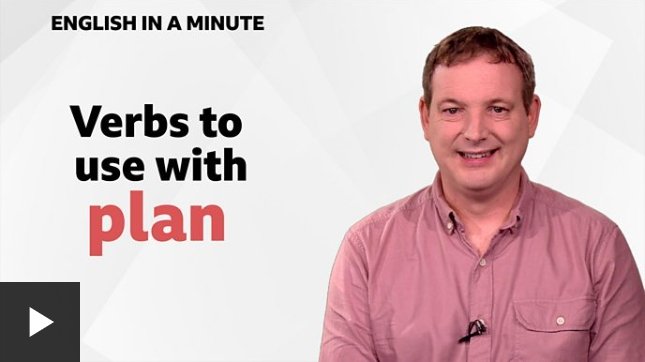Introduction
A plan is a description of what you are going to do. There are some words that we often use with it. These are called collocations. Learn some of the verbs that we often use with the noun ‘plan’ with Phil in this video.
Common collocations with ‘plan’
make a plan
If we make a plan, then we create it. This is the simplest way to say this.
- We’ve got so much to do, and I don’t know where to start. Let’s make a plan!
develop a plan
Another way to say create a plan is develop a plan. This can suggest that there are a few steps to creating a plan.
- I’m in the middle of developing a plan for tomorrow. I’ll tell you what we’re doing once I’ve finished.
devise a plan
This is a way to say that you are creating a plan. If you devise a plan, you do it in a clever way.
- This event is going to be difficult to organise, but I think we can devise a good plan between us.
formulate a plan
If you formulate a plan, then you work it out carefully and methodically, with a lot of thought.
- We need to formulate a detailed plan for this project. It will make everything easier once we start.
implement a plan
If you implement a plan then you make it happen. Implementing a plan is using a plan to do things.
- Don’t worry! If something goes wrong, we can just implement our emergency plan.
go ahead with a plan
Go ahead with a plan means to start doing what you’ve planned. We also use it to say that we’ve chosen a particular plan to implement.
- We had two suggestions. We’re going to go ahead with the first plan because it looks more fun.
press ahead with a plan
Press ahead with a plan can mean start or continue a plan, and we often use it when a plan is difficult or unpopular.
- I know you don’t like it, but we’re going to press ahead with the marketing plan beause we don’t really have an alternative.
drop a plan
If you drop a plan, you decide not to do it, or to stop doing it.
- Your idea looks like it will take a long time. We don’t have much time, so we’re going to drop your plan, I’m afraid.
scrap a plan
Scrap a plan means decide not to do something. It’s the same as drop a plan but slightly more informal.
- So much has changed that we’re going to have to scrap all our existing plans – they’re not suitable anymore.
shelve a plan
If you shelve a plan, you decide not to do it, or to stop doing it but you might save it for a later time.
- On reflection, I don’t think we’re ready so we’re going to shelve that plan for now.
TRANSCRIPT
Note: This is not a word-for-word transcript.
Phil
Wait, I’ve got a plan! Let’s learn verbs to use with ‘plan’.
Before you can have a plan, you need to make one, or develop one. You devise a plan or formulate a plan when you think about it a lot.
I asked Maria to develop a plan for tomorrow’s project. She’s spent all day devising one.
We’ve carefully formulated a plan to get more clients.
Next, it’s time to implement your plan – that means start doing it. We can also say we go ahead with a plan. We press ahead with a plan if we are starting, or continuing, a difficult plan.
We’re going ahead with plan B. It’s easier to implement.
You need to press ahead with the recovery plan.
If it doesn’t work, you can drop a plan. You can also scrap a plan. They just mean stop. You can shelve a plan if you might come back to it later.
We need to drop the plan. Results are bad.
Do you want to scrap the plan, or just shelve it?
